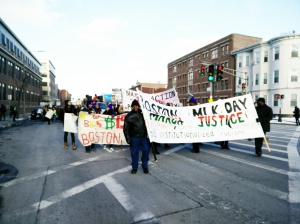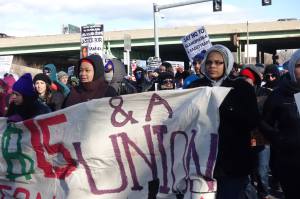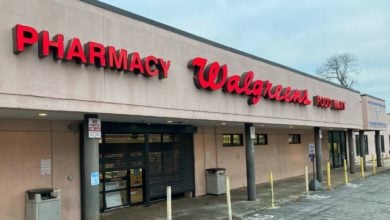
Photo: J. Zaldana.
When Deontez Wimbley from the Charles St. AME Church beautifully belted out in the frigid cold the question, “Which side are you on, my people, which side are you on?” the hundreds who joined the Martin Luther King Jr. Day March for Justice unequivocally chanted back, “We on the freedom side!” For the next three plus hours, demonstrators took to the streets of Boston’s Dorchester neighborhood and marched for over a two mile stretch along Columbia Road.
Initiated by Mass Action Against Police Brutality, the action was organized by the MLK Day March for Justice Committee and was comprised of fast food workers with the Fight for $15, local high school and college students, faith based organizations like Mass Muslims, Charles St. AME Church, Bethel AME Church and the First Baptist Church of Jamaica Plain, labor unions like SEIU Locals 32BJ, 1199 and the Boston School Bus Drivers Union USW Local 8751, the Roxbury South End Tenants Association, International Action Center, ANSWER Coalition and many others.

The powerful action linked the struggles against police brutality with the movement for a $15 an hour minimum wage and a union, and tied together the fights against racial and economic injustice was well as bigotry and Islamophobia.
Wayne Dozier, whose grandson DJ Henry was shot and killed by police in Peaceville, NY in 2010, spoke at the opening rally across from the Massachusetts State Police barracks. “I’m going to be 63 this month and I’m out here with you young folks because you guys got the power,” Dozier told the crowd. He went on to say that “we have to rebuke these systems that are killing our children, destroying our finances and destroying our faith. We have to march on and change what is going on in America – we’re not going to take it no more.” Dozier helped carry the lead banner of the march, which listed the action’s four main demands: “Jail Killer Cops! Fight for $15 and a union! No to Islamophobia! End institutionalized racism!”
Carla Sheffield, whose son Burrell Ramsey-White was shot and killed by Boston Police in 2012, spoke at the closing rally at the Grove Hall Mecca shopping center. For the last four years, she described how their family has been fighting for justice and demanding answers from the Boston Police and the Suffolk County District Attorney’s office. “What kind of system is this when the police, who are arresting our children, but you have their friends, the DA’s, prosecuting them, and then you have their friends, the judges, slapping them on the wrist. We’re not saying all cops are killers, but the ones who kill need to be behind bars,” Sheffield demanded before the supportive crowd.
Linking the movement against police brutality with the Fight for $15
While marching down Columbia Road, demonstrators stopped at a KFC, where organizers with the Fight for $15 led a rally inside the restaurant. Darius Cephas, who works at Dunkin Donuts and is a member of the Fight for $15’s national organizing committee, told Liberation News, “We’re tired of them not jailing these killer cops and we’re tired of not being able to pay for our bills, for basic necessities. We’re tired of begging.” Cephas described the fast food industry as “a billion dollar business, they have the money, they can afford to pay us a living wage but they choose not to.”
The March for Justice would later stop and rally again at a Burger King, where Jena Benson, a Dunkin Donuts worker and Dorchester resident, told the crowd, “$10 [an hour] does not do what I have to do for my family, it does not provide food for my family.” An organizer with the Fight for $15, Benson energized the crowd by ending with, “They don’t want us to win $15 and a union, but you know what? We’re going to get it because when we fight, we win!”
Workers demand a living wage and a union
Many at the March for Justice had earlier in the day been in East Boston, where SEIU Local 32BJ led the #PovertyDoesntFly action, demanding $15 and a union for airport workers. Roxanna Rivera, Vice President of 32BJ described the dire situation for low wage airport workers who are employed by non-union contractors that are outsourced by the major airlines. She described how these workers have “no meaningful benefits and harsh working conditions. And even though they work every day, many of them full time, they still have to rely on public assistance to get by.” After the rally, the workers and their supporters marched into one of the airports terminals where Rivera was one of six people were arrested in an act of civil disobedience for refusing to leave.
At the rally in East Boston’s Memorial park, Liberation News spoke with Gimiraldo Mendoza, a unionized Logan airport worker and member of SEIU 32BJ. Mendoza said that, “I see many workers here at the airport who do the same job like me, they are working hard like me, but they don’t have the same benefits as me. They deserve more, they deserve insurance, sick days, vacation pay.”
Uniting against racism and bigotry
Maddie Conway, an organizer with 32BJ, tied together the need for a union and deep connection with racism, telling Liberation News, “The union and collective action is what will ensure that our victories keep moving forward. I think there is a war on people of color and on poor people in this country and that’s done in a lot of ways. It’s done through police brutality. It’s done through systemic racism that keeps people from getting jobs.”
Back at the March for Justice in Dorchester, Benson spoke to Liberation News on the importance of “raising awareness about Islamophobia” and the backlash faced by Muslims. This was an important component of the March for Justice and at the closing rally in Grove Hall, a representative from the organization Mass Muslims addressed the crowd. She said, “I’m tired of the Presidential candidates, people who are vying to be our leader, throwing around my identity as if Muslim were an insult…and bigoted rhetoric of who can and who cannot be welcomed into this country on grounds of their faith. But we are still here…we are here because we are tired and that will not stop us from marching, from speaking truth to power.”
Nadia Ben-Yousseff of Adalah, a Palestinian Human Rights organization, spoke to Liberation News on the importance of an international movement against injustice. “The way we are going to change our society is by recognizing how the oppression is interlocked. Our liberation is tied, you will not have liberation for Palestine, until you have liberation for Black people in this country, “ noted Ben-Yousseff. “The importance of linking with struggles against colonialism and white supremacy around the world is that it highlights where the oppression stems from – and when you look at Palestine, you really understand white supremacy in this country.”
Overall, youth and enthusiastic energy were on display throughout the March for Justice. It was felt through the drumbeats and heard in the songs the crowd sang. In Mass Action Against Police Brutality’s call to action for the March for Justice, the group wrote that “Martin Luther King, Jr. believed that mass mobilization was necessary to combat what he called the three evils of society – militarism, racism and economic exploitation.” By raising its four demands and by uniting organizers active in each of those areas, the March for Justice was a positive step forward in strengthening the larger movement for justice.
Check out more photos of the action at Facebook Event page and from Normal Photos.
Nino Brown contributed to this article.





